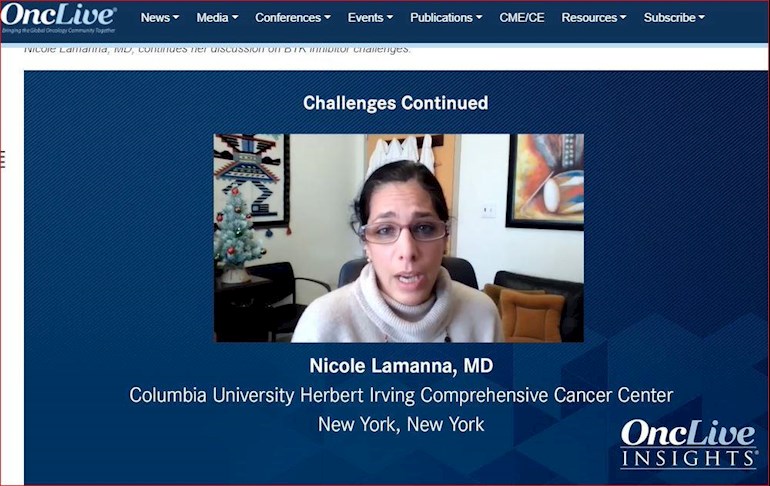Nicole Lamanna, MD, continues her discussion on BTK inhibitor challenges.
onclive.com/view/challenges...
-
This video is intended for Medical Professionals, using Med-Speak at a rapid pace, so I have pasted the transcript below.
-
Nicole Lamanna, MD: With the advent of the BTK [Bruton tyrosine kinase] inhibitors and the fact that we’ve had many individuals on ibrutinib and now even acalabrutinib for many years, there’s no doubt that we’re starting to see some patients who develop resistant mutations to the covalent BTK inhibitors. This is not so common. There have been a lot of real-world data that suggest that the majority of discontinuations, usually about 40%, may be due to toxicity and not necessarily progressive disease. We have identified resistant mutations that occur. Usually, we’ll see them somewhere between 3 to 5 years on therapy with a BTK inhibitor. They’re not so common. The development is anywhere from approximately 3% to 8%. Again, when they occur, you’ll sometimes notice that somebody’s lymph nodes might start to grow again, or maybe they’re just starting to have an elevation of their white blood cell count.
You can send off peripheral blood testing to look for the most common mutation, a C481S mutation. There’s also a PLC-gamma mutation. There are some patients for whom you cannot identify either of these. Some people have both of these. That doesn’t mean they’re not progressing, but certainly the most common mutation to identify is a C481S mutation. There are some patients for whom you might identify this early. The questions that usually come up is what’s the next step? Can you transition them to an alternative agent? Actually, some patients may have a white count that is rising but do not experience cytopenia or bulky lymphadenopathy and are asymptomatic. I could argue that you could maintain some of those individuals on their current therapy until you need to change them. This is because some of them can stay on therapy for quite some time despite their white count starting to rise, or you see a return of their disease. There are other individuals who have high-risk features in which I will advocate for a change in therapy sooner rather than later. Certainly, given the data that we have, naturally one would consider going to a BCL2 inhibitor such as venetoclax.
With the covalent BTK inhibitors, there are resistant mutations that can develop, and thankfully, there are other drugs in evaluation that can overcome the C481S mutation. These are the noncovalent BTK inhibitors. The furthest along in development and updated at a recent ASH [American Society of Hematology] meeting, was LOXO-305, or pirtobrutinib. Then, more immature data were done with MK-1026, or nemtabrutinib; now it has a name. That formerly was the ArQule drug, which also is a little more immature in data but is showing some efficacy as well. Certainly, we have some options of switching patients who develop these resistant mutations either to venetoclax, which is FDA approved, or I should say a venetoclax-based combination with a monoclonal antibody. Or, these noncovalent BTK inhibitors, particularly pirtobrutinib, will likely get FDA approved as well in the future. That will be an important consideration for a patient who develops a resistant mutation.
This transcript has been edited for clarity.
-
Len
